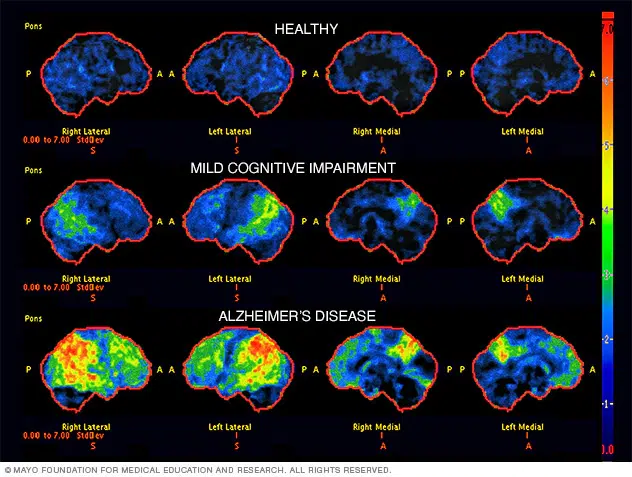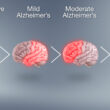Early Signs of Alzheimer’s Disease
The Haunting Shadow: Initial Indications and Manifestations of Alzheimer’s Disease
Alzheimer’s disease (AD) is a neurological condition that worsens over time and gradually impairs a person’s ability to think clearly, remember things, and eventually do even simple everyday tasks. The early stages of the symptoms can be modest and easily confused with ordinary forgetfulness, but they do get worse over time. This blog entry clarifies the early warning signs and symptoms of Alzheimer’s disease, enabling readers and carers to spot possible problems and get help.
Table of Contents

Memorization Gaps: Not Just Forgetting
Early Signs of Alzheimer’s Disease
One of the most common and obvious signs of Alzheimer’s disease is memory loss. But it’s important to distinguish between memory lapses that are symptomatic of a more serious problem and occasional forgetfulness, which is a typical occurrence. Here are a few warning signs:
- Forgetting Recent Conversations or Events: It may be concerning if you routinely forget recent conversations or specifics of events that someone recently told you.
- Frequently losing important items: Frequently misplacing wallets, keys, or other valuables in strange locations may indicate the onset of memory loss.
- Having Trouble Following Directions or Finishing Known Tasks: Even once-simple duties, like paying payments or following a recipe, can become more difficult.
Early Signs of Alzheimer’s Disease
It’s crucial to remember that other conditions like stress or sleep deprivation can also cause these symptoms. However, seeking medical advice is advised if memory issues become bothersome and interfere with day-to-day activities.
Beyond Memory: Additional Warning Symptoms to Monitor
Early Signs of Alzheimer’s Disease
Although memory loss is the most common early symptom of Alzheimer’s disease, other symptoms can also appear:
- Language Difficulties: Having trouble following discussions, having trouble finding the right phrases to use, or struggling to find the right words can all be early signs.
- Issues with Spatial Reasoning: Spatial disorientation may manifest as challenges navigating familiar areas, estimating distances, or becoming lost in a previously visited location.
- Modifications to Decision-Making and Judgement: Making bad choices or displaying strange habits, such ignoring your money or personal hygiene, can be concerning.
- Alterations in Personality and Mood: Withdrawal, heightened anxiety or despair, or an easy tendency to become frustrated are some of the early indicators of Alzheimer’s disease.
Early Signs of Alzheimer’s Disease
These alterations could be slow and subtle, frequently misinterpreted as ageing symptoms or peculiarities in personality. But if you notice more than one of these symptoms, especially if they get worse over time, you should get checked out.
Warning Signs of Early Alzheimer’s
Early Signs of Alzheimer’s Disease
Even while Alzheimer’s usually strikes older people, a less common type called early-onset Alzheimer’s can strike anyone younger than 65. Though the progression could happen more quickly, the early indications and symptoms are identical. Other warning signs of Alzheimer’s disease with an early onset include:
- a significant family history of Alzheimer’s: The risk is increased if a close relative has been diagnosed with early-onset Alzheimer’s.
- Unexpected and notable behavioural or personality changes: Abrupt behavioural shifts that are out of character for the person may call for additional research.
- Early signs that interfere with job or social life: It may be concerning if you have trouble completing previously doable work duties or if you significantly reduce your social interactions.
Getting a full medical evaluation is essential if you think you or a loved one may have early-onset Alzheimer’s in order to make an early diagnosis and maybe arrange a course of therapy.
The Value of Timely Diagnosis
Early Signs of Alzheimer’s Disease
There are various advantages to having an early diagnosis of Alzheimer’s disease:
- Access to Treatment Options: Although Alzheimer’s cannot be cured, there are interventions and drugs that can help control symptoms and enhance quality of life.
- Planning and Preparation: With an early diagnosis, people and their families can decide on future care and living arrangements with knowledge.
- Engagement in Research Studies: Patients in the early stages of a condition may be qualified to take part in clinical trials for novel drugs and therapies.
Getting medical attention as soon as there are any concerns can greatly improve the quality of life and management of Alzheimer’s.
In summary: early detection leads to empowered action
Early Signs of Alzheimer’s Disease
Alzheimer’s disease can have subtle early indications and symptoms, so being aware of them and vigilant is essential. You can take proactive measures to manage the disease and make future plans by becoming aware of the warning signs and getting professional examination when problems arise. Early detection equips people and families with the information and resources they need to successfully traverse this difficult journey.


